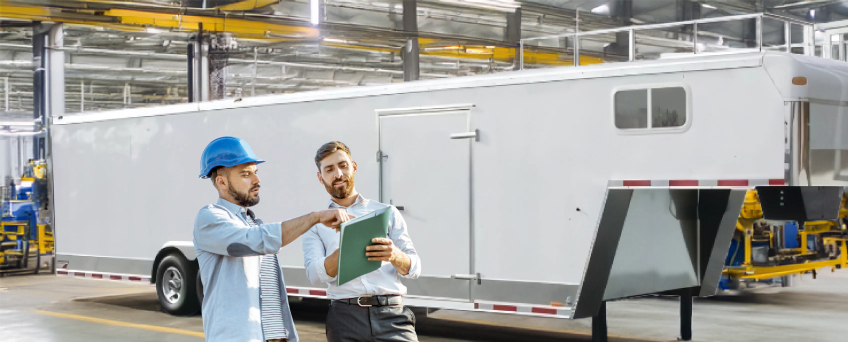Decided to buy a fifth-wheel trailer? Wait. It is not an easy decision. It involves a big investment, so you need to be doubly sure of your choice. It requires careful consideration of the crucial factors that affect your use of the fifth wheel trailer.
We all know the multiple applications of fifth wheel trailers - hauling large machinery, vehicles, and other heavy cargo. This is because this trailer's design ensures stable, safe, and efficient transportation. But it is essential to ensure that the trailer delivers high performance, improves ROI, and effectively addresses your cargo hauling needs. This assurance results from selecting the right trailer for your application.
This blog explores the various key considerations you must look into before buying a new fifth-wheel trailer.
Understand the Purpose of Your Fifth Wheel Trailer
The first factor affecting your choice of a fifth-wheel trailer is its purpose. The application for which you will use the trailer affects other factors, like dimensions, load capacity, and customizations.
You must identify what cargo you will be hauling:
- Cars or race cars
- Motorcycles/ATVs
- Commercial goods
- Industrial equipment
For each of these cases, you must consider:
- Specific dimensions and weight considerations that will suit your needs
- Necessary height clearance from the authorities
- Dual or triple axles and suspension for load stability during the journey
- The facility to ensure easy loading and unloading of the cargo (ramps, hydraulics, etc.)
- Open decks or enclosed structures
- Tie-downs, shelves, and storage compartments for safety and other tools storage
- Frame, flooring, and walls to handle weight distribution and avoid corrosion
- Interior and exterior lighting for compliance and safety
- The type of towing vehicle and compatibility with the trailer
- Other customizations of trailer, such as solar panels, cameras, or spare tier carriers
If the application is full-time living, mobile office, or long-distance travel, you will need more space considerations in your trailer, including the following:
- Installations for appliances and fixtures
- Custom layout with CAD design
- Electrical, plumbing, water, and waste management systems
- Climate control features
Assessing your exact primary and alternate use of the fifth wheel trailer is essential before buying.
Choose the Right Size and Axle Configuration
What matters when you tow your trailer through the roads from the origin to the destination? Stability, maneuverability, and safety. The factors that ensure these three are:
-
Trailer Length & Deck Space
If the trailer is too short, you can carry limited cargo. If it is too long, maneuverability at sharp corners and narrow roads is challenging. Knowing what cargo you will carry gives you a better idea of the ideal trailer length and deck space. -
Axles, Payload, and Weight Distribution
If heavy-duty hauling is your need, use a triple-axle trailer because it ensures better weight distribution, contributing to braking efficiency and stability. A two-axle trailer can safely manage only a medium load. If the weight distribution is incorrect, the trailer might either sway or cause excessive hitch pressure.
Another critical aspect is the payload capacity of the trailer, which requires determining all the weight that your trailer will carry, except for its own weight. If you exceed this number, your suspensions may fail, or the stopping distance might increase. -
Deck Height & Access Options
Trailer accessibility when loading and unloading cargo also affects the choice. It's better to keep a lower deck height to ease loading and reduce the risk of damage. In the case of higher decks, you will need additional ramps or lifts, adding to your cost. A lower deck also has a lower center of gravity, which will assist in its stability on the road.
Material & Build Quality: Why It Matters
The age-old debate: Aluminum vs steel.
What matters in your choice is that the fifth wheel trailer must have excellent performance, high fuel efficiency, and long-term durability. Aluminum offers all this and more.
- Aluminum doesn't corrode. Its resistance to rust makes it a preferred material for use in all weathers. Since steel rusts easily, you will need to regularly paint it for rust prevention and maintenance, increasing your costs.
- Since aluminum is corrosion-resistant, aluminum-framed trailers last longer than steel-framed ones.
- Steel is heavier than aluminum, resulting in reduced payload capacity, difficulty in maneuverability, and lower fuel efficiency.
- The high durability of aluminum trailers increases their lifetime value and resale value in the market.
- Having said all of this, there is nothing at all wrong with a steel-framed trailer. They offer the same load capacity as an aluminum trailer, but they are significantly less expensive. As long as you're prepared to do the proper upkeep on a steel-framed trailer, it will last for years and years of service.
Another decisive factor is that the trailer must be manufactured in a US factory. This ensures the following benefits:
- Compliance with DOT, EPA, and other regulations that conform to high standards of quality.
- Factory-direct products have genuine warranties, where you can deal with the maker directly when something goes wrong.
- US-made means you can easily get parts and accessories with short lead times and easy delivery.
- Factory-direct trailer means you do not have to pay any dealer markups, resulting in lower costs. Also, you can get a higher resale value.
- Factory-direct facilitates customization, technical support, and customer services post-purchase.
Trailershowroom.com is the best go-to destination for your need for factory-direct, US-made, high-quality fifth wheel trailers.
Towing Requirements: What You'll Need
Your fifth-wheel trailer purchase also requires considering the towing vehicle.
A fifth-wheel trailer is heavy, so you need a heavy-duty pick-up truck to tow it. Moreover, mounting this trailer requires space, which is available in a truck, but not in SUVs and vans.
You have two hitch options: gooseneck and fifth wheel, based on the need. If the application is car hauling or travel, use the fifth wheel to enjoy a smoother ride. Alternatively, a gooseneck trailer uses a ball hitch, which can be removed when not in use. It results in less smooth rides, which are manageable if the trailer is used for agriculture or commercial purposes.
A well-tested and properly installed brake controller and hitch are also essential factors. The hitch rating and mounting must be equal to, or rated heavier than, the trailer. Moreover, you must comply with the federal or state-level brake controller requirements defined for different weight capacities.
Your truck's payload capacity, rear axle weight rating (RAWR), and gross combined vehicle weight rating (GCVWR) are mandatory truck specifications that must be checked. By staying within their limits, you can avoid suspension damage, tire blowouts, and road safety violations.
Helpful Reads:
Fifth Wheel Trailer Sizes Explained: How to Choose the Right One for Transport Needs
How Much Does a Fifth Wheel Trailer Cost? Factors Driving the Price
Final Thoughts: Make an Informed Investment
Owning a fifth-wheel trailer means having a long-term asset with high ROI. But you cannot just go and buy it without giving it a deep thought. It requires careful consideration of factors, such as your purpose of the trailer, size and weight, axle configuration, body material, build quality, and the type of towing vehicle. If these are well-thought-out and customized to your application, you will generate great value from this investment.
Buying the right fifth-wheel trailer ensures excellent hauling performance, durability, and easy towing and maneuverability. If you want such high-quality trailer performance, consider buying your fifth wheel trailer from Trailershowroom.com.
Trailershowroom.com is a popular US vendor of high-quality trailers to businesses, the government and military, and individuals. Our team understands your transportation needs and personalizes the trailer accordingly. Besides, we also provide trailer financing and delivery support to make the purchase easier and smoother for you.
Is buying a fifth-wheel trailer confusing you? Contact us for expert guidance and drive away with the perfect trailer.
FAQs
-
Q1: What is the right weight of a fifth-wheel trailer?
There is no right or wrong in a fifth-wheel trailer's weight. It must align with your application of the trailer. You must check the truck's maximum trailer rating and the trailer's gross vehicle weight rating. The cargo weight, truck's payload capacity, truck's rear axle capacity, and trailer's tongue weight are critical considerations to determine the perfect weight of your fifth wheel trailer.
-
Q2: I have a huge truck and a good budget. Can I buy any fifth-wheel
trailer?
A heavy-duty truck and a good amount of money to invest are not the only considerations before buying a fifth-wheel trailer. Your use of the trailer, cargo type, frequency of trips, and many other factors affect the choice. For informed decision-making, connect with our team at Trailershowroom.com. We will assess your requirements and recommend the best solution with necessary customizations.





